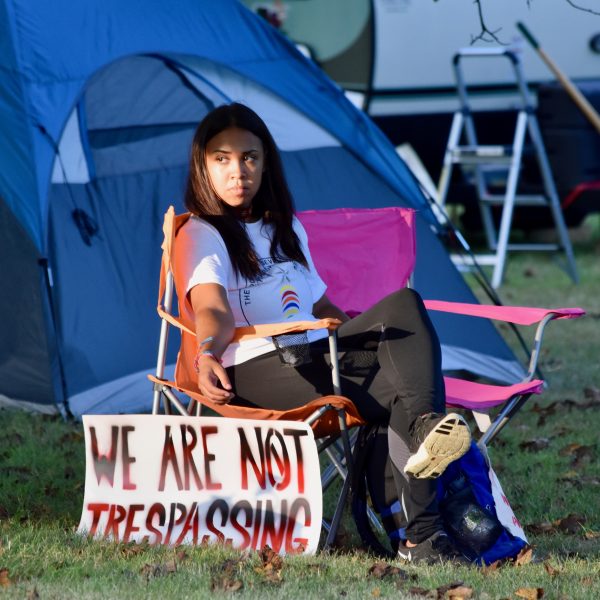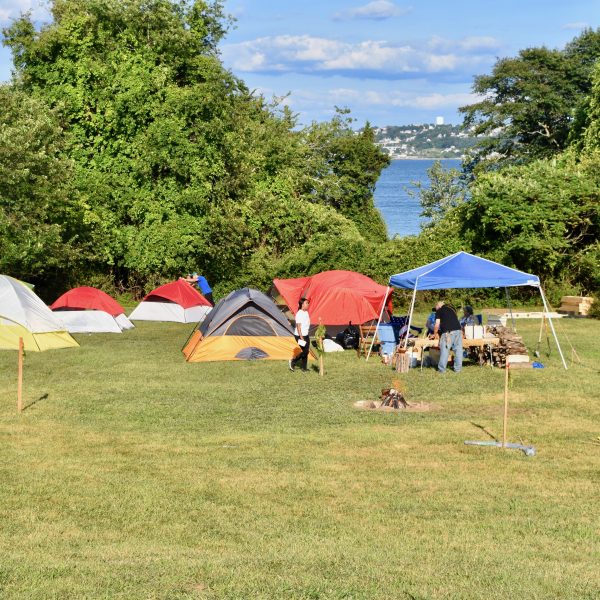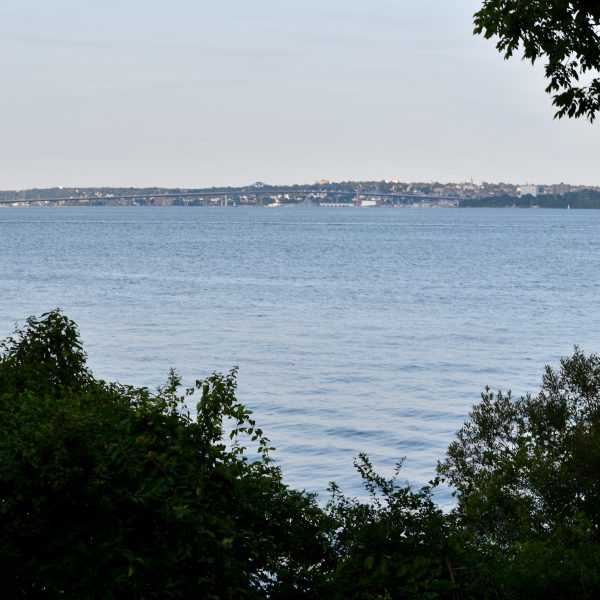Pokanoket Tribe occupies Bristol land, say it belongs to them not Brown

By Bob Plain on August 20, 2017
More than 50 Native Americans and their allies occupied waterfront land in Bristol on Sunday for what they called ???a long term encampment,??? saying the gorgeous spot overlooking Mt. Hope Bay belongs to the Pokanoket Tribe, not Brown University.
???We as aboriginal citizens have been denied our birthright to our family???s land, our sovereignty rights, therefore states and powerful organizations have held our wealth over and over to the point that they believe it is their natural gift and natural right to have our property.??? Sagamore William (Po Wauipi Neimpaug) Guy Pokanoket Tribe/Pokanoket Nation, according to a press release.
The land is known as Potumtuk by indigenous people; white people call it Mount Hope. The Pokanoket Tribe says it belongs to them.
???Brown University does not have an Aboriginal Title to the land, given that King Philip???s ancestral line has never signed over their right to the land,??? according to the press release. ???The tribe has used the law and legal avenues to make known their legal standing and rightful land ownership of the Pokanoket Nation. The Tribe has a lawsuit seeking pending against the town of Bristol and the State of Rhode Island and has recorded Public and Constructive Notices to the town of Bristol.???
In a statement on its website Monday morning, Brown said it does own the land.
???Brown University owns land in Bristol, Rhode Island, that is currently the site of an encampment set up by the Bristol-based Pokanoket Nation,??? said the statement. ???The University upholds the rights of individuals to assemble peaceably to express their views, provided that their actions do not infringe upon the rights of others ??? including the free exchange of ideas ??? or interfere with the rights of others to take part in the activities of Brown???s academic community and campus life.???
Brown says it was given the land by the by the Haffenreffer family in the 1950s. ???The property ownership was legally transferred to Brown, and the University has been a positive steward of the land,??? says the statement. ???Brown has maintained clear legal title for more than 60 years.???
Brown added this sentence to its original statement: ???Brown has maintained and is committed to its productive working relationships with the recognized Indigenous Nations in this area.???
The activists occupying the land as of Sunday afternoon named the encampment Po Metacom Camp.

???As a result of the ongoing neglect of the environmental needs of Sowams and due to the Tribe???s historic significance to and aboriginal relationship with the land, the Pokanoket tribe is taking the lead to ensure that Sowams is properly reconstituted to its pristine, healthy and productive environmental state, creating a sustainable habitat for the local wildlife and surrounding local community,??? says the press release.
Sowams is the name of the original Native American settlement in the Bristol/Warren area. While American history often labels these people more broadly as Wampanoags, Bristol and Warren were Pokanoket lands prior to the King Phillip???s War in the 1670s. It was believed most, if not all, Pokanoket people were killed during or after the King Phillip???s war. But according to a 2016, EcoRI story, ???In fear of losing their lives, the Pokanokets learned to be close-mouthed about their identity.???
The EcoRI story also mentions the land in question. ???For many years, Brown University was the caretaker of a piece of land adjacent to Mount Hope Farm that held particular significance for the Pokanokets. In 2014, the Providence university turned the stewardship of that parcel over to Jennifer Bristol, [Mount Hope Farm???s] executive director. Those additional acres include King Phillips Seat, a rocky outcrop at the base of Mount Hope, and a marker where he was killed during the war.???
The Pokanoket people helped run a day camp there, according to the EcoRI story. ???Now in its second year, the farm runs Camp Wetu, a summer day camp for children. The camp features a strong Native American theme. The children are led by the current Pokanoket chief, Bill Guy, who teaches tribal arts, crafts, dancing and music. The young campers learn to make tools from what is available in nature, as the Pokanockets did, and tribal rituals are held in a circular gathering spot under pine trees.???
The Pokanoket people say they are willing to occupy the land until Brown engages in meaningful dialogue about the rightful owner of the land.

???The Pokanoket Tribe are the people who welcomed the Pilgrims, who were seeking religious freedom, to this country,??? says the press release. ???Yet the Pokanoket cannot practice their own spiritual and cultural traditions without having to ask permission to gain access to their own ancestral lands.???
Steve Ahlquist,??who was on the scene as the encampment came together this afternoon, contributed to this report. He took all the pictures.
